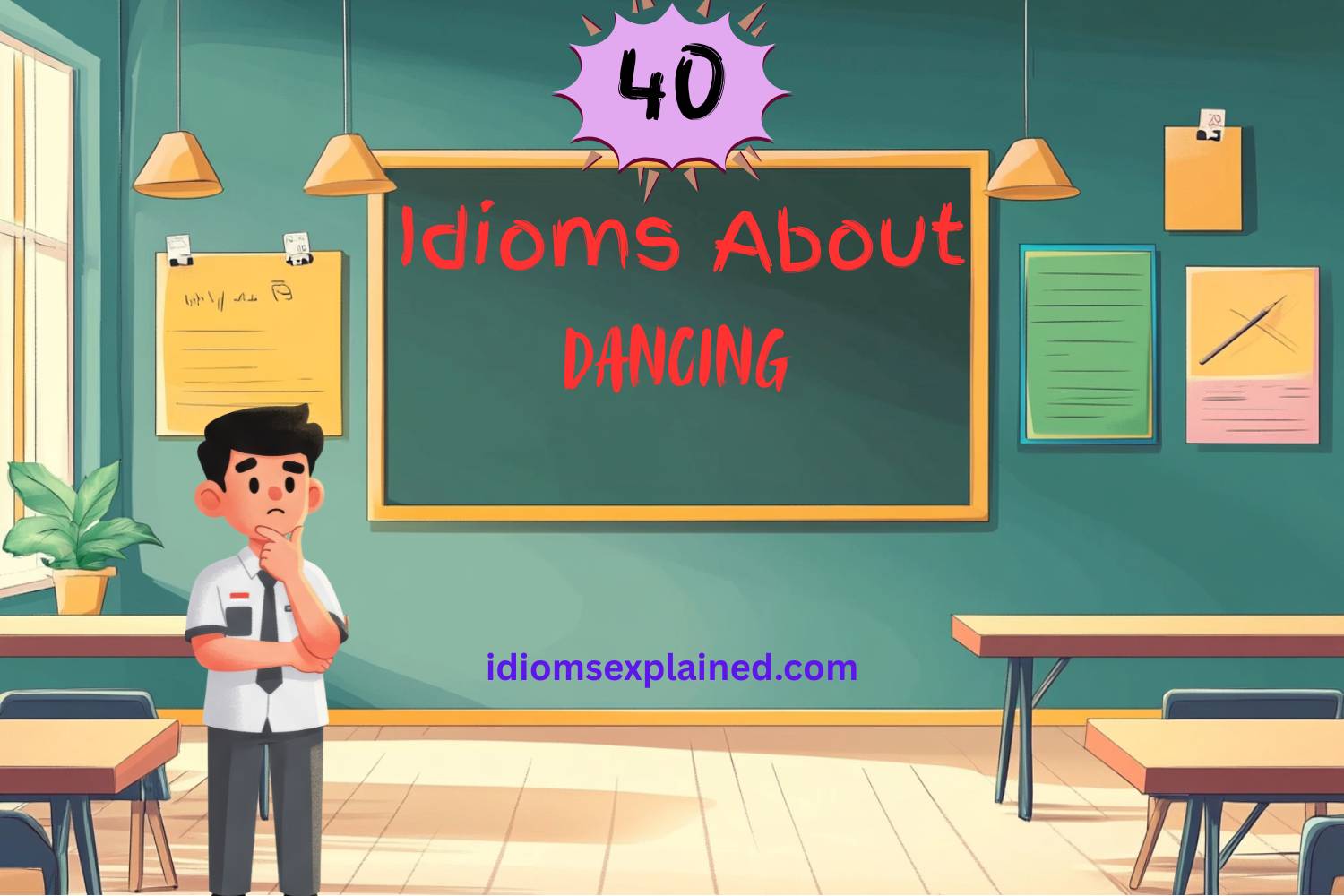Dancing is a universal activity that people enjoy all over the world. It brings joy, fun, and energy to those who participate in it. Just like in any other activity, people use unique phrases or idioms related to dancing. These idioms help us express ideas in a creative way, making our language more lively and colorful.
In this article, we will explore idioms related to dancing and their meanings. These phrases often have deeper meanings that are different from the literal interpretation of the words. Understanding and using these idioms can help you communicate more effectively and add a fun twist to your conversations.
Idioms about Dancing
1. Dance to someone’s tune
Meaning: Do what another person wants.
Example: The kids had to dance to the teacher’s tune during rehearsal. / He always dances to his big brother’s tune.
Put Differently: Follow someone’s rules. / Do what another person says.
2. Lead someone a merry dance
Meaning: Make things hard or confusing for someone.
Example: The dog led us a merry dance through the park. / My little brother led me a merry dance all morning.
Put Differently: Make someone chase you around or work harder than needed. / Cause trouble in a playful way.
3. All-singing, all-dancing
Meaning: Very fancy or full of extra things.
Example: We saw an all-singing, all-dancing version of the school play. / Her project was all-singing, all-dancing with colors and music.
Put Differently: Very fancy and full of fun parts. / Has many extra features.
4. Trip the light fantastic
Meaning: Dance in a fun or skillful way.
Example: The couple tripped the light fantastic at the party. / We tripped the light fantastic at the school dance.
Put Differently: Dance with style. / Move to music in a fun way.
5. It takes two to tango
Meaning: Both people share the blame or work.
Example: Don’t just blame her it takes two to tango. / Arguing takes two to tango.
Put Differently: Both sides are part of it. / Two people are needed for something to happen.
6. Dance attendance on someone
Meaning: Do everything for someone right away.
Example: He danced attendance on his grandma when she was sick. / The waiter danced attendance on the guests.
Put Differently: Take care of someone’s every need. / Be quick to help someone.
7. Quick on your feet
Meaning: Able to think or act fast.
Example: You have to be quick on your feet in dodgeball. / She was quick on her feet during the quiz.
Put Differently: Think fast. / React quickly.
8. Make a song and dance about it
Meaning: Make something seem bigger than it is.
Example: Don’t make a song and dance about losing a pencil. / He made a song and dance about the small mistake.
Put Differently: Make a fuss. / Overreact about something small.
9. Dance in the streets
Meaning: Celebrate happily in public.
Example: Fans danced in the streets after the team won. / People danced in the streets during the festival.
Put Differently: Celebrate loudly and happily. / Show joy openly.
10. Change your tune
Meaning: Change your opinion or attitude.
Example: He changed his tune after hearing the full story. / She changed her tune about homework after seeing her grades.
Put Differently: Think differently now. / Switch to a new idea.
11. Call the tune
Meaning: Be the one in charge.
Example: In our group, Sarah calls the tune. / The coach calls the tune on game day.
Put Differently: Be the leader. / Make the main decisions.
12. Face the music
Meaning: Accept the result of your actions.
Example: He had to face the music after breaking the rule. / She faced the music when the teacher saw her note.
Put Differently: Take responsibility. / Deal with the result.
13. Put on your dancing shoes
Meaning: Get ready to have fun.
Example: Put on your dancing shoes it’s party time! / We put on our dancing shoes for the school disco.
Put Differently: Get ready for a good time. / Be prepared for fun.
14. Dance with danger
Meaning: Take a big risk.
Example: Running across the icy street is dancing with danger. / Climbing that tall tree was dancing with danger.
Put Differently: Do something risky. / Take a chance.
15. Step on someone’s toes
Meaning: Offend or upset someone.
Example: I didn’t mean to step on her toes by correcting her. / He stepped on the coach’s toes by giving orders.
Put Differently: Make someone upset. / Interfere in someone’s job.
16. Dance the night away
Meaning: Dance for a long time.
Example: We danced the night away at the wedding. / They danced the night away at the prom.
Put Differently: Dance for hours. / Keep dancing all night.
17. Join the dance
Meaning: Take part in something.
Example: He joined the dance after watching for a while. / I finally joined the dance during the talent show.
Put Differently: Take part in the action. / Become involved.
18. Dance to a different beat
Meaning: Be different from others.
Example: She dances to a different beat with her art. / He dances to a different beat in fashion.
Put Differently: Do things your own way. / Be unique.
19. Give someone the runaround
Meaning: Avoid giving a straight answer.
Example: The store clerk gave me the runaround about the refund. / He gave her the runaround instead of helping.
Put Differently: Avoid answering directly. / Waste someone’s time.
20. Dance your heart out
Meaning: Dance with full energy.
Example: She danced her heart out at the talent show. / We danced our hearts out at the concert.
Put Differently: Dance with passion. / Give your best while dancing.
21. Step up the dance
Meaning: Make something move faster or with more energy.
Example: We stepped up the dance to finish the routine. / The team stepped up the dance for the final part.
Put Differently: Speed up the action. / Add more energy.
22. Keep in step
Meaning: Stay in agreement or match someone’s pace.
Example: You have to keep in step with your partner. / The team kept in step during the march.
Put Differently: Move together. / Stay in sync.
23. Out of step
Meaning: Not in agreement or moving differently.
Example: He was out of step with the rest of the class. / The drummer was out of step in the parade.
Put Differently: Not matching others. / Doing things differently.
24. Dance to the rhythm
Meaning: Follow a set pattern or mood.
Example: The crowd danced to the rhythm of the drums. / We danced to the rhythm at the concert.
Put Differently: Move with the beat. / Follow the flow.
25. A slow dance
Meaning: A calm, gentle time.
Example: We had a slow dance under the stars. / The slow dance was the last song of the night.
Put Differently: Gentle dancing. / Moving softly to music.
26. Two-step around
Meaning: Avoid something directly.
Example: He two-stepped around the question. / They two-stepped around talking about the problem.
Put Differently: Avoid the main point. / Go around the issue.
27. Kick up your heels
Meaning: Have fun and enjoy yourself.
Example: We kicked up our heels at the party. / The class kicked up their heels after exams.
Put Differently: Have a great time. / Celebrate with fun.
28. Dance in the palm of your hand
Meaning: Control someone completely.
Example: The magician had the kids dancing in the palm of his hand. / She had the crowd dancing in her palm.
Put Differently: Make someone follow your lead. / Have full control.
29. Dance like nobody’s watching
Meaning: Be free and not care about what others think.
Example: She danced like nobody’s watching at the fair. / He danced like nobody’s watching in the living room.
Put Differently: Be yourself. / Enjoy without worrying.
30. All danced out
Meaning: Too tired from dancing.
Example: I was all danced out after the party. / We were all danced out before midnight.
Put Differently: Very tired from dancing. / No more energy to dance.
31. Dance around the subject
Meaning: Avoid talking directly about something.
Example: He danced around the subject when asked about the homework. / She danced around the subject of grades.
Put Differently: Avoid saying something clearly. / Talk without giving a direct answer.
32. Waltz in
Meaning: Enter easily or without effort.
Example: He waltzed in and got the best seat. / She waltzed in and joined the game.
Put Differently: Enter without trouble. / Join smoothly.
33. Waltz through
Meaning: Do something with little effort.
Example: She waltzed through the test. / He waltzed through the chores.
Put Differently: Finish something easily. / Do something without stress.
34. Dance in the moonlight
Meaning: Do something magical or romantic.
Example: They danced in the moonlight at the beach. / We danced in the moonlight at camp.
Put Differently: Enjoy a special moment at night. / Have a magical time.
35. Last dance
Meaning: The final chance to do something.
Example: This is our last dance before summer break. / It was the last dance of the night.
Put Differently: Final moment to enjoy. / One last chance.
36. Steal the show
Meaning: Be the main attraction.
Example: Her dance stole the show at the recital. / He stole the show with his cool moves.
Put Differently: Be the best part of an event. / Get all the attention.
37. Toe the line
Meaning: Follow the rules.
Example: You have to toe the line in dance practice. / The team toed the line during tryouts.
Put Differently: Do what’s expected. / Follow the rules closely.
38. Have two left feet
Meaning: Be clumsy at dancing.
Example: I have two left feet when it comes to salsa. / He danced like he had two left feet.
Put Differently: Not good at dancing. / Move awkwardly.
39. Swing into action
Meaning: Start working quickly.
Example: The dancers swung into action when the music started. / We swung into action for the final rehearsal.
Put Differently: Start moving fast. / Begin working right away.
40. Dance of joy
Meaning: Move happily to show excitement.
Example: She did a little dance of joy after winning the prize. / We danced with joy after the big win.
Put Differently: Move happily when excited. / Celebrate with happy movements.
“Rewrite the Sentence”Activity: Idioms about Dancing
Below are 10 sentences that describe feelings or situations about dancing. These sentences do not use idioms. Your task is to rewrite each sentence using one of the idioms about dancing you have learned. Make sure the new sentence still makes sense and sounds natural.
Sentences to Rewrite
- Emily started moving around when she heard the music.
- I was so excited that I began dancing alone in my room.
- The kids couldn’t wait to start the dance.
- We all danced until we were really tired after the party.
- Sarah was so happy when she found out she won the contest.
- They had to work together for the school play to be successful.
- Everyone at the party was having fun and dancing to the music.
- I felt great when I finally finished the dance routine.
- Tim and his friends didn’t care about what others thought, so they danced freely.
- Jack was nervous at first, but he joined the dance with confidence.
Answer Key
- Emily started to shake a leg when she heard the music.
- I was so excited that I broke into a dance alone in my room.
- The kids couldn’t wait to get into the groove and start the dance.
- We all danced the night away at the party until we were really tired.
- Sarah was dancing on air when she found out she won the contest.
- They had to tango with each other for the school play to be successful.
- Everyone at the party was dancing to the beat of their own drum and having fun.
- I felt like a superhero in action when I finally finished the dance routine.
- Tim and his friends danced like nobody’s watching, not caring about what others
- Jack was nervous at first, but he waltzed in with confidence and joined the dance.
Conclusion
In conclusion, idioms about dancing help make language more colorful and fun. They allow us to describe emotions and actions in creative ways, making our conversations more exciting. Whether we’re talking about dancing with joy, working together in a group, or expressing excitement, these idioms help us connect to others and express our feelings in a playful manner.
By learning and using these idioms, you can add more flavor to your conversations, especially when talking about dancing or having fun. Remember, idioms are not just for language lessons.they can be used anytime to show how we feel and how we see the world around us! Keep practicing, and soon these phrases will feel natural in your everyday speech.




